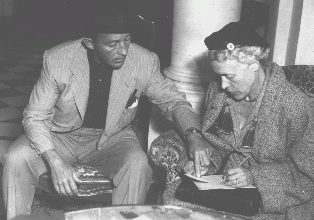Page 96
[Begin Tape 1, Side A]
Biagi: I wanted to start today's discussion talking about your experience being asked to leave AP, essentially, because of the mandatory retirement age there.
Beebe: I wasn't asked. That was another thing about it. [Laughter.] I think it was before I went to Europe, when I was just working along there, that I got a pamphlet. Once in a while, the AP would put out one, you know, about policies and stuff. Buried down in it was this little paragraph about the policy for women to retire at 55. I was sort of startled. Of course, nobody in my office had ever heard anything about it.
Biagi: About when did you get this pamphlet, do you know? Had you been there for a while?
Beebe: Oh, no, nothing was said when I came at all. Never. I think it was probably shortly after my husband's death and I just came back and was working there. It startled me, and I asked around did anybody know about this. Nobody did. Of course, there wasn't any other woman. I was uneasy, but really I kind of put it aside, because I always was confident that if you were good, you didn't really need to worry, you know. [Laughter.] If they wanted you, if you were really good, they needed you, and it was probably an outdated thing, anyway.
However, when I was taking stock of career, I had it in mind and thought if it should turn out to be true, I'd better hurry to do something, because who knew? There wasn't an awful lot of time ahead. Then the only notice I got was from the business office in New York. You see, that's automatic. You do give them your birth certificate when you come, and therefore, when Joe or whoever, no matter what he does in the AP, you just get this notification that your pension will be so and so and you'll be doing it at this time. So then, of course, I did get busy about it. We had a new national executive. I didn't know any of the New York people by that time, or very few. I said, "I realize there's probably a transition time that this would be changed." He didn't know that there was any change. I said, "Well, is it taken into consideration at all a person's record?"
He said, "Well, you know, I've talked to lots of men at retirement time, and they always think they're as good as they ever were." Of course, he didn't know anything about me or anything, but that was pretty discouraging.
Biagi: So you were approaching 55?
Beebe: That's right. I was 47 when Edwin died. Then it took me quite a long time, this campaign, to get to Europe. I decided that I'd better move and do something. I was just treading water there and perfectly content to do it. The stuff kept coming.
Well, the head of the Guild came to me and said, "You know, if you'd consent, we'd really like to make a case of this, because you're a good subject, you see. You've got a good record, and we'd like to do it." I was mortified, of course. I had read stories about women who were fired and made a fuss. I always privately thought they probably weren't much good, anyway. [Laughter.] I just didn't want to be in that position. So I said I'd really rather not.

